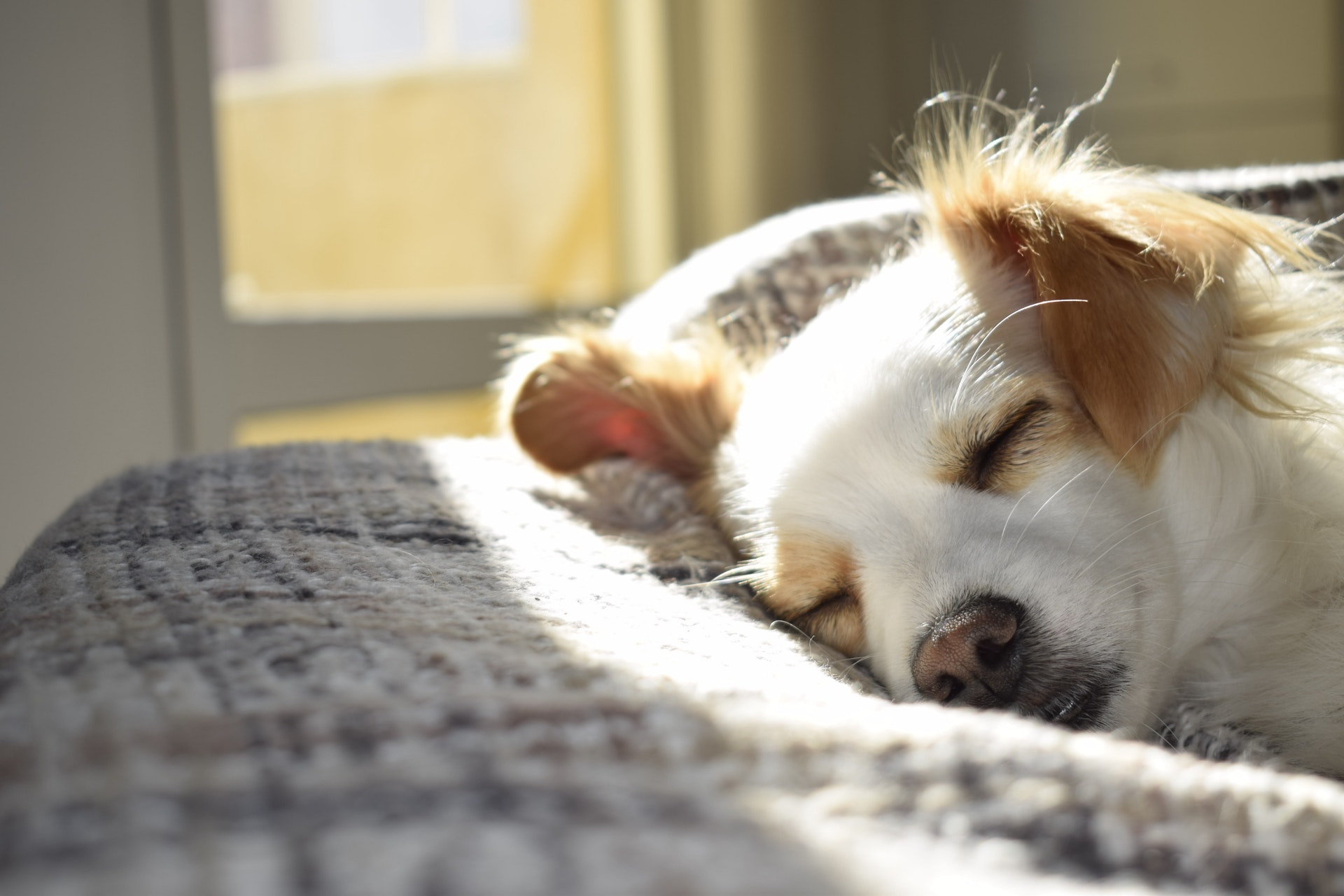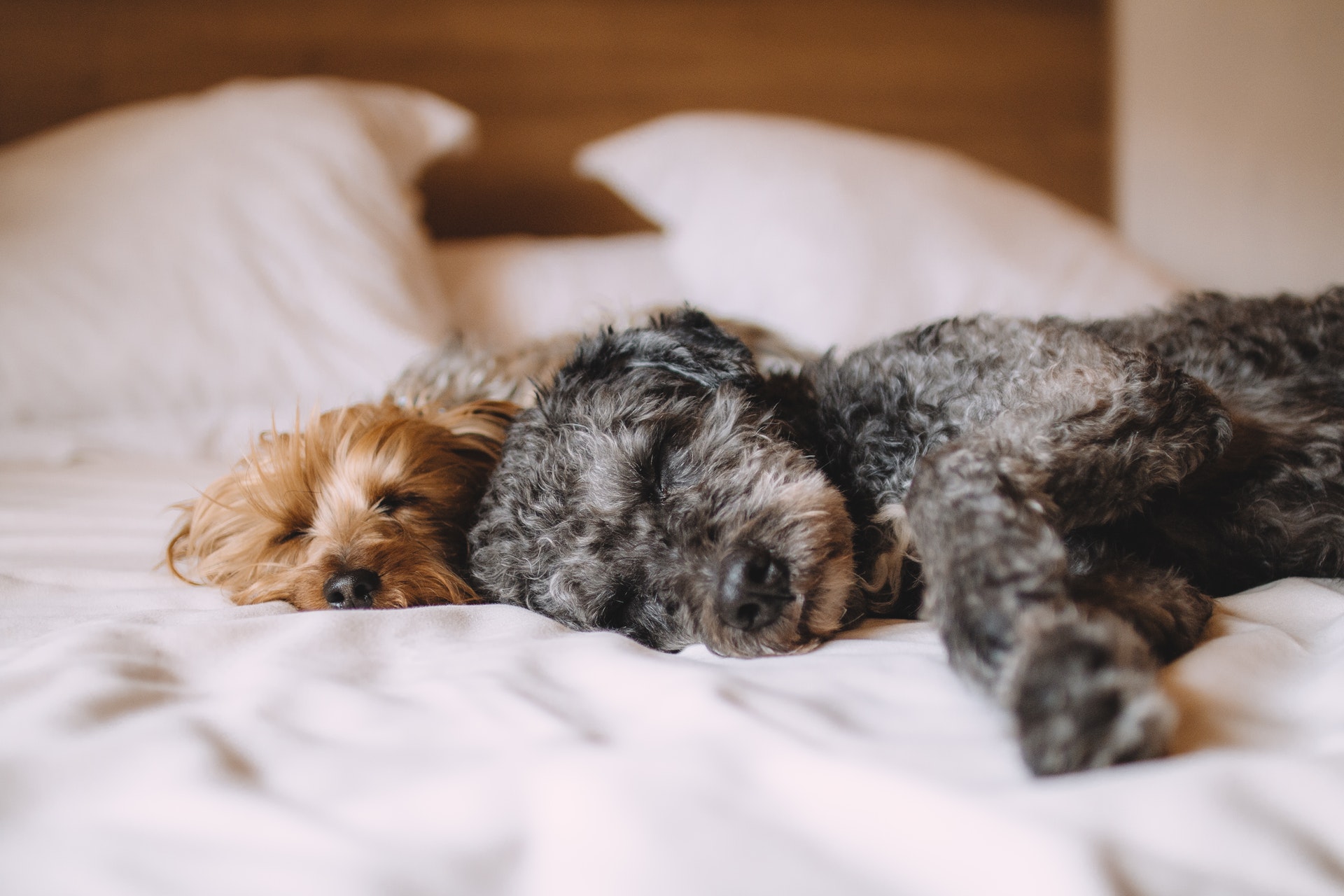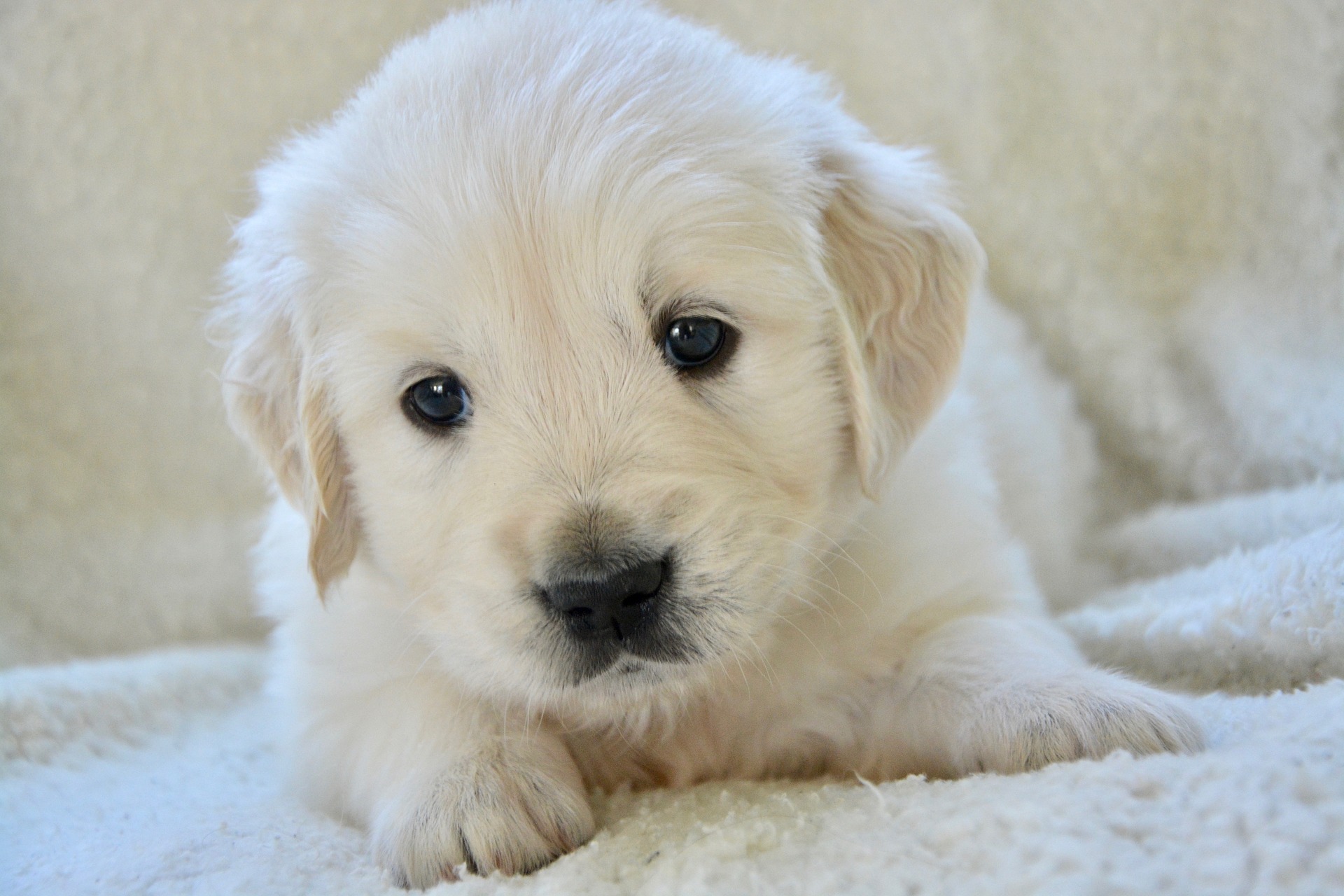If you’re wondering how to stop a puppy barking at night then I feel for you. As do the thousands of other puppy owners dealing with the exact same issue.
I mean, puppies bark, that’s a fact. And while there’s more than one way to eliminate this unwanted behavior, what do you do if all of their needs are already being met and their persistent barking just won’t stop?
…Do you leap out of bed and go soothe their worries?
…Do you put your head under the pillow and try to ignore it?
It may come as a surprise to learn that neither of these common solutions happens to be exactly right.
Obviously, there is a problem and it is our job as a responsible owner to figure it out and come up with a solution.
The first step? …teaching your pup how to control their emotions.
See, emotional control isn’t naturally a learned behavior in pups. And to make matters worse, it’s often an overlooked part of the training process which is why negative behaviors like barking seem to present themself when the occasion doesn’t call for it.
It’s also something Dan Abelnoor talks about extensively in the introduction to his Puppy Coach Program in the short video below.
So before you do anything else, watch the video, take on board the training Dan recommends, and you’ll see a huge improvement in your puppy’s ability to refrain from barking.
Here’s the link to take a look: Click Here To Discover How To Finally Stop Your Puppy Frustrating, Annoying Night-Time Barking Habit… Even If You’ve Tried And Failed Before!
(video will open in a new window)
Why Do Puppies Bark At Night?
Puppies – just like human infants, use all kinds of means to explore their new world.
Sure they will scratch and chew to find out what different surfaces feel like (and are edible!), play constantly to establish boundaries, and last but not least use vocal prompts to try and interact with their pack – namely us.
Barking is just one of a number of vocalizations that they use to draw our attention.
Reasons for doing so during puppyhood tend to focus upon unmet/unfulfilled needs such as…
- Hunger
- Thirst
- Needs the bathroom
- Boredom
- Stress
- Isolation
These are just six examples and it is important to understand that there are countless reasons why your pup may be barking.
Just to complicate things further, there are no ‘rules’ over what constitutes normal or excessive barking.
Sure it’s common and frankly, you ought to be more worried if a puppy never/rarely barks at all.
But there are limits on what constitutes acceptable behavior.
So if you’re worried about your pup’s general barking through the day, then look carefully for what could be causing their distress.
Remember to also think with your nose and ears!
Chances are that in most cases – and especially with puppies who are left alone over the day – that it will be a combination of separation anxiety and attention seeking behavior.
There are ways to train these unwanted traits out from an early age, and you’d be well advised to look into them as doing so offers a much more easily trained dog during adolescence and adulthood.
But what about puppies who may be fine during the day, but go barking crazily when bedtime rolls around?

So Why Is My Puppy Barking At Night?
First and foremost it is necessary to understand that it is normal for very young puppies – especially those freshly introduced to their new home – to bark at night.
After all, it is the first time that they have experienced away from their litter.
Combine this with their having very small bladders, and needing to go frequently during the night, and it is a simple recipe for barking behaviors.
Much like a young human baby, they are going to require attention at this stage and there’s no way a good owner can avoid having to pay that level of attention.
In these cases, there is a strong chance that it is an early sign of separation anxiety and the sooner that this is addressed the better.
But before we look into training/coping techniques let’s just take a moment to make certain that there are no underlying reasons why your puppy is barking at night.
So before bedtime make sure your puppy is…
- Adequately fed and watered
- Exercised
- Clearly tired
- Expresses no daily discomfort
- Has a suitably sized cage
It is up to the owner whether or not at this stage they may wish to consult a veterinarian beforehand as puppies can sometimes be prone to urinary tract disorders.
But if they can freely wee at will during the day, then be expected to hold it in overnight, it can often be a frequent cause of discomfort.
If you’re concerned perhaps consider mentioning it during a routine visit for any scheduled jabs.
In most cases, there will only be a cause to make a special appointment if the following training tips do not deliver any improvement.
Puppy’s Barking Driving You Crazy? Click Here To Discover How To Finally Stop Your Puppy Frustrating, Annoying Night-Time Barking Habit… Even If You’ve Tried And Failed Before!

How To Stop A Puppy Barking At Night
OK, so Fido the puppy just won’t stop barking throughout the night and it’s now time to take some action.
First of all – pat yourself on the back for making a good choice.
Much as some people would have you believe it, very few puppies will ‘grow out’ of this kind of behavior and if anything it is the express lane to having an over dependant adult dog.
The good news is that many of these tips can deliver real success provided they are used consistently and very early upon the pup’s arrival in their new home.
Just make sure that everyone in the household follows these pretty simple rules and hopefully you’ll be set to a good nights sleep before long.
One word of caution/disclaimer – never expect any immediate results with puppies.
Some will happily adapt and mellow within days, others may take months, and some will skit haphazardly between the two!
Just keep patient and results will come.
And remember, never scold a puppy for accidents or slipping up. We’re looking to make them obedient and relaxed not stressed and confused.
Make That Crate A Puppy Paradise
Crates are necessary to both keep your puppy safe during those early months and also prevent damage to the rest of the home.
However, very few pups automatically take to them for understandable reasons.
Crates prevent them from accessing all the things that they cannot get enough of – fun, food, and believe it or not, you!
Therefore it is essential to introduce puppies to their crate very soon after you have brought them home.
Sure it may be tempting to let them snuggle in bed for the first night, but that is seriously unadvised. And by doing so you’ll be establishing a norm which can be very difficult to break!
Instead, you ought to be looking towards making your puppy’s crate as appealing as possible – and have it ready for the moment they enter the home.
But what turns a dour grey crate into a puppy dreamland? Here are the essentials:
#1 – Pick a good location
One of the most frequent mistakes new puppy owners make is assuming that the ideal location for a puppy crate is in a utility area.
Wrong!
Puppies are going to be pretty frightened in a brand new environment and adding isolation to their stresses is going to make them prone to anxiety barking.
Therefore it is important to begin with – for the first few nights at least – to have them within visual sight of you.
Yes, that most probably means in the bedroom!
Your pup will be calm because they can bark when they need to use their potty, and once sated will realize that it’s back to bedtime.
Over the next couple of weeks try and gradually move the crate further and further away.
Take a few days of them being in a different room, and by this time they should be well accustomed to sleeping in their crate anyway, and happy enough to be able to simply hear/smell your presence without getting stressed at not being able to see you.
The trick is to find a balance between not rushing this while also not making it become habitual.
In most cases, it will – fingers crossed – go smoothly and without any sudden outbursts of barking.
Should this happen, attend to their needs as you can and try again.
If it persists over another night, move the crate back to the last upstairs position for a short while and try again.
Once downstairs, try and keep the crate somewhere that you tend to congregate/socialize/play.
Avoid that spartan utility area unless there is no alternative, the point is to locate the crate where it will associate the dog with their pack.
Get this right and barking will hopefully be avoided or at least a distant memory.
#2 – Comfort = Quiet
Your puppy is going to wake up several times during the night.
This is normal behavior.
What we want is a puppy who rather than automatically barks for immediate attention (for whatever reason) is one who will roll over and chew on a toy before dozing back to sleep.
To achieve this idyllic scenario we need to make sure that the pup’s crate is as comfortable as possible.
So good, in fact, that they may even choose to chill out there a while during waking hours.
Size is important when selecting a crate. Few things stress dogs out more than not having enough space to pace a few steps.
The problem, of course, is that much as we’d like huge crates they are simply not always very practical – especially when following the advice laid out above whereby they will need regular moving around.
So pick a crate suitable to your breed and fill it with…
- Cozy cushions (that you won’t miss when they become dirty)
- Plenty of toys including puzzles packed with treats
- A water bowl
- Scented garments of you and family members
Other potential aids may include using good quality ‘puppy calming’ scents. Sometimes these work, sometimes they don’t but generally speaking, they are worth a try.
Pup Driving You Crazy? Click Here To Discover How To Finally Stop Your Puppy Frustrating, Annoying Night-Time Barking Habit… Even If You’ve Tried And Failed Before!
#3 – To Cover, Or Not To Cover?
Now many owners, especially those in noisy urban areas find that placing a cover over the cage can work wonders for encouraging dogs prone to barking to just sleep away instead.
Blankets provide not only a sense of comfort and security, just like being hidden in a den, but can also play a great role in establishing a routine between you and your pooch.
Being able to get them comfortable in their cage and then cover it over ought to imply that it’s sleep times.
Just be sure that playtime resumes the moment that it is removed in the morning.
Some dogs really like being covered over, while for others it may worry them and actually cause barking.
However, it is worth experimenting with as something so simple can now and again provide such a simple and effective solution.
#4 – Further Crate Tips
The whole point of crating your pup is to make them feel secure, comfortable and familiar with sleeping there. The more this can be reinforced, the better.
For example, if they doze off just gently pick them up (carefully with support underneath) and place them in their cage.
Do this consistently and there’s a good likelihood that sooner or later they will head there themselves.
When you notice this happening just be sure to reward them every time they do so!
Positive reinforcement is essential throughout puppy training and this is one of the best traits any puppy owner would want to see!
You may also want to consider feeding meals exclusively inside the crate.
It needn’t be forever, but it will once again associate their crate with being a place where good things happen.
The downside, of course, is the potential mess but that is a godsend compared to barking throughout the night.
How To Schedule The Day To Avoid Your Puppy Barking At Night
So we’ve already touched upon how important schedules can be to preventing nighttime stress induced barking, but it is worth briefly providing a few pointers that will assist with successful crating.
Just like a typical family routine, try and keep everything to around about the same time of day.
From your pup’s perspective, these revolve around food, exercise (both kinds), playtime, bedtime.
Many people underestimate and/or forget that puppies are fast learners and have a very acute body clock that is sensitive to disruption.
Chaotic as they may seem – your puppy is in fact very schedule orientated!
So if you stay up very late one evening before putting them to bed, then they are going to feel disrupted.
Likewise, if you are late feeding them or ignore them during playtime then that will be taken onboard.
It cannot be stressed enough how important consistency is during those early puppy months.
Disruption will lead to nighttime barking become much more likely.
In the worst case scenario, they will learn that barking serves to summon your presence even if there is no reason for it.
Should this become the case, then it is up to you to evaluate the situation and learn when to ignore it – at the cost of many sleepless nights until they eventually learn their lesson…
What About Morning Wakefulness?
Anyone who also keeps cats will know their penchant for demanding food at 5am.
Fortunately, dogs are much more malleable when it comes to first light, and can be trained to understand that early sunlight still means it’s nighttime and that they ought to be asleep.
Many puppies, especially those zonked out after hours of evening playtime – will happily roll around and sleep quite easily until dawn breaks.
Then the barking will sound because they expect you to be up and around already.
Those who have experienced will know that this can be as frustrating as being woken at 3am, especially on weekends!
Plenty of owners find success here by using alarm clocks.
Set your alarm to go off around 30 minutes before your puppy typically wakes up. Quietly greet your pup and go through the morning routine without any fuss.
Reward them if they stay quiet.
Repeat this process every day but move the alarm forward by 10 minutes.
You’ll hopefully realize that even if your puppy wakes at their standard time, that rather than barking for attention, they’ll just assume they have woken up early and go back to doze.
It may take a few attempts but this can be a golden method for scheduling your dogs to be ready to rise at your time.
Final Thoughts
With luck, the above will help anyone who has experienced the relative nightmare that can be puppies prone to nighttime barking.
Training them to understand the importance of letting you sleep through the night is an essential part of their upbringing – and of course their introduction to the family pack.
Do not assume that this is a phase that will simply pass. As with all aspects of puppy training, there is a very clear correlation between effort and reward.
But the more you invest in them during their early socialization, the better they will cope as adults.
Dealing with nocturnal barking effectively is a godsend for preventing or at least reducing the chance of them developing separation anxiety troubles in adulthood.
The key is to help them understand that there are limits to what you can provide and that no harm will come to them when crated up for a good nights sleep.
Do you have any tips or experiences on how to stop a puppy barking at night? Please feel free to add your thoughts in the comments…
(video will open in a new window)


